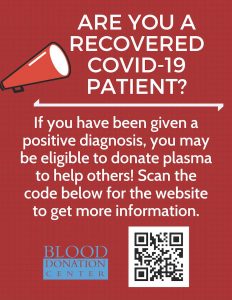The UNC Medical Center is now collecting convalescent plasma from recovered COVID-19 patients to help current UNC Health COVID-19 patients, under FDA guidelines. UNC School of Medicine researchers are planning a clinical trial to analyze coronavirus antibody responses in patients who receive convalescent plasma.

The UNC Convalescent Plasma Task Force at the UNC Medical Center in Chapel Hill is collecting convalescent plasma from donors to treat patients critically ill with COVID-19, under an expanded access protocol from the FDA.
Eligible donors must have tested positive for COVID-19 (PCR positive swab) and be at least 14 days from resolution of symptoms. If individuals are between 14 and 28 days from onset of symptoms, they would need to receive a second COVID swab to confirm that they test negative. Plasma collection will take place at UNC-Chapel Hill each Saturday by appointment only.
Potential donors must also meet all criteria for typical blood donation. To be screened to donate plasma, individuals are asked to complete the screening questionnaire at: GO.UNC.EDU/PLASMA.
Interested participants can also email questions to: CCP_UNC@med.unc.edu.
In the past, convalescent plasma has served as a method for treating infectious diseases when there was no other means of therapy. Plasma is the liquid portion of blood that contains the protective immunity (antibodies) still present after individuals have recovered from an infection.
Researchers know from the global experience with the 2002-2003 SARS outbreak, as well as Ebola epidemic, that this type of therapy has the potential to help COVID-19 patients. Whether convalescent plasma is a beneficial therapy may depend on the concentration of antibodies present in the plasma and specific anti-viral properties of antibodies from different recovered donors.
As part of the UNC Convalescent Plasma Task Force, a multidisciplinary team of UNC School of Medicine researchers will study the antibody responses of patients who receive plasma donated through the UNC Blood Donation Center. The goal is to learn as much as possible as quickly as possible about the mechanisms by which antibodies help patients recover.